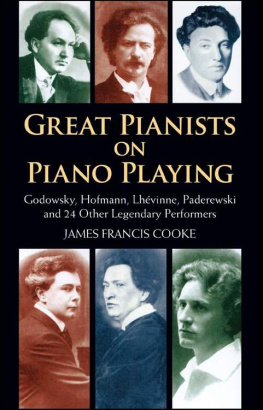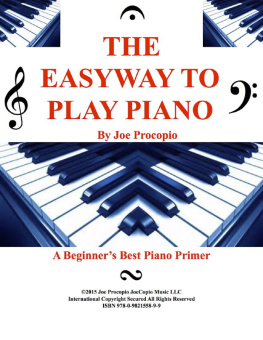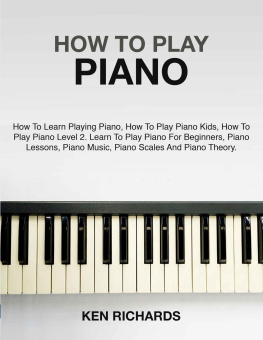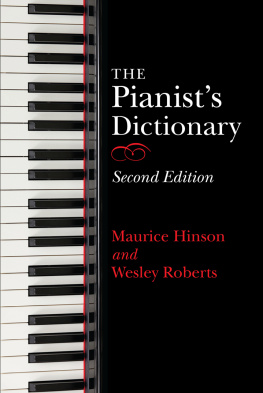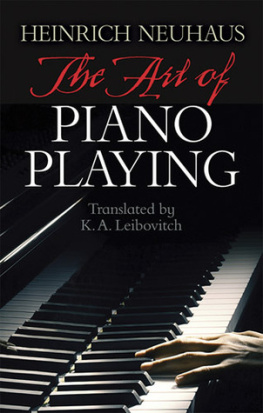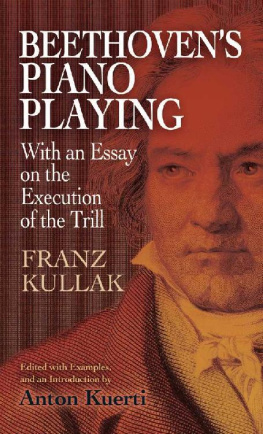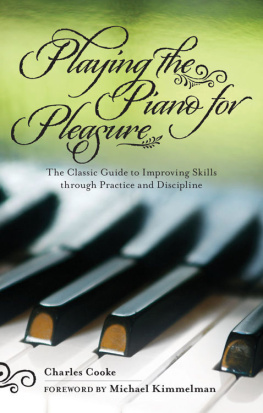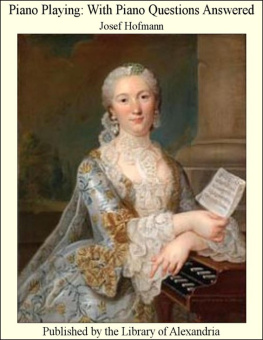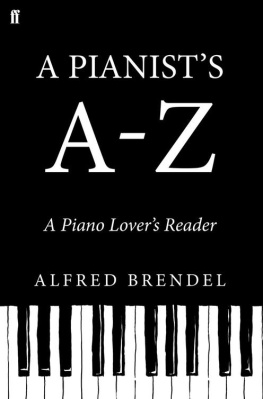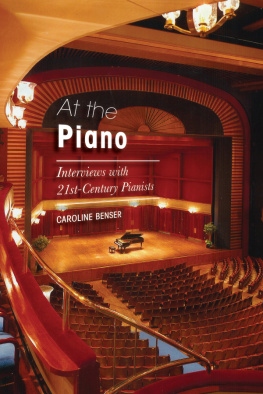Great Pianists on Piano Playing
Godowsky, Hofmann, Lhvinne, Paderewski and 24 Other Legendary Performers

James Francis Cooke
DOVER PUBLICATIONS, INC.
Mineola, New York
Copyright
Copyright 1999 by Dover Publications, Inc. All rights reserved.
Bibliographical Note
This Dover edition, first published in 1999, is an unabridged, lightly corrected and reorganized reprint of the work originally published by Theodore Presser Co., Philadelphia, 1917, under the title: Great Pianists on Piano Playing / Study Talks with Foremost Virtuosos by James Francis Cooke, subtitled "A series of personal educational conferences with renowned masters of the keyboard, presenting the most modern ideas upon the subjects of technic, interpretation, style and expression.
The original contents page has been lightly edited and newly set, with the original roman chapter numbers in the text replaced to match that listing. The authors semi-alphabetical chapter sequence has been retained as it appeared in the 1917 edition.
With one exception, pianists photographsnow grouped between pages 120 and 121prefaced each chapter in the original. The photograph of Ferruccio Busoni originally appeared in The New Grove Dictionary of Music and Musicians, Vol. 3, p. 509; Macmillan Publishers Limited 1980. There was none in Cookes original edition. Expanded photograph captions are newly added.
Library of Congress Cataloging-in-Publication Data
Great pianists on piano playing: Godowsky, Hofmann, Lhvinne, Paderewski, and 24 other legendary performers / [compiled by] James Francis Cooke.
p. cm.
Originally published: Philadelphia: T. Presser, 1917.
ISBN 0-486-40845-0 (pbk.)
1. PianoInstruction and study. 2. Pianists. 3. Piano Performance. I. Cooke, James Francis, 1875-1960.
Manufactured in the United States by Courier Corporation
40845006
www.doverpublications.com
C ONTENTS
THE ARTISTS LIFE
T HE V IRTUOSOS C AREER AS I T R EALLY I S
T HE father of a young woman who was preparing to become a virtuoso once applied to a famous musical educator for advice regarding the future career of his daughter. I want her to become one of the greatest pianists America has ever produced, he said. She has talent, good health, unlimited ambition, a good general education, and she is industrious. The educator thought for awhile, and then said, It is very likely that your daughter will be successful in her chosen field, but the amount of grinding study she will be obliged to undergo to meet the towering standards of modern pianism is awful to contemplate. In the end she will have the flattery of the multitude, and, let us hope, some of their dollars as well. In return, she may have to sacrifice many of the comforts and pleasures which women covet. The more successful she is, the more of a nomad she must become. She will know but few days for years when she will not be compelled to practice for hours. She becomes a kind of chattel of the musical public. She will be harassed by ignorant critics and perhaps annoyed by unreliable managers. In return she has money and fame, but, in fact, far less of the great joy and purpose of life than if she followed the customary domestic career with some splendid man as her husband. When I was younger I used to preach quite an opposite sermon, but the more I see of the hardships of the artists life the less I think of the dollars and the fame it brings. It is hard enough for a man, but it is twice as hard for a woman.
G OLDEN B AIT
Some cynic has contended that the much-despised Almighty Dollar has been the greatest incentive to the struggling virtuoso in European music centers. Although this may be true in a number of cases, it is certainly unjust in others. Many of the virtuosos find travel in America so distasteful that notwithstanding the huge golden bait, the managers have the greatest difficulty in inducing the pianists to come back. Indeed, there are many artists of great renown whom the managers would be glad to coax to our country but who have withheld tempting offers for years. One of these is Moritz Moszkowski, probably the most popular of modern pianoforte composers of highclass music. Grieg, when he finally consented to make the voyage to America, placed his price at two thousand five hundred dollars for every concerta sum which any manager would regard prohibitive, except in the case of one world-famous pianist. Griegs intent was obvious.
The inconveniences of travel in America have been ridiculously exaggerated in Europe, and many virtuosos dread the thought of an American trip, with the great ocean yawning between the two continents, and red-skinned savages just beyond New York or certainly not far from Chicago. De Pachmann detests the ocean, and when he comes over in his favorite month of June he does not dare return until the following June. Others who have never visited America must get their idea of American travel from some such account as that of Charles Dickens in his unforgivable American Notes (1842), in which he said, in describing one of our railroads:
There is a great deal of jolting, a great deal of noise, a great deal of wall, not much window, a locomotive engine, a shriek and a bell. The cars are like shabby omnibuses holding thirty, forty, fifty people. In the centre of the carriage there is usually a stove, fed with charcoal or anthracite coal, which is for the most part red hot. It is insufferably close, and you see the hot air fluttering between yourself and any other object you may happen to look at.
There could have been but little improvement in our railroads in 1872 when Rubinstein came to America, for although he accepted $40,000 for 215 concerts during his first trip, he refused an offer of $125,000 for only 50 concerts when a manager tried to persuade him to return.
American railroads now present the acme of comfort, convenience, and even luxury in travel, yet the European artist has difficulty in adjusting himself to journeys of thousands of miles crowded in a short winter season when he has been accustomed to little trips of a few hundred kilometers. He comes to dread the trains as we might a prison van. Paderewski resorts to a private car, but even this luxurious mode of travel may be very monotonous and exhausting.
The great distances must certainly account for some of the evidences of strain which deform the faces and exhaust the minds of so many virtuosos. The traveling salesman seems to thrive upon miles of railroad travel as do the crews of the trains, but the virtuoso, dragged from concert to concert by his showman, grows tiredoh, so tired, pale, wan, listless and indifferent! At the beginning of the season he is quite another person. The magnetism that has done so much to win him fame shines in his eyes and seems to emanate from his fingertips, but the difference in his physical being at the end of the season is sickening. Like a bedraggled, worn-out circus coming in from the wear and tear of a hard season, he crawls wearily back to New York with a cinematographic recollection of countless telegraph poles flying past the windows, audience after audience, sleeping cars, budding geniuses, the inevitable receptions with their equally inevitable chicken salad or lukewarm oysters, and the sweet young things, who, like Heines mythical tribe of Asra, must love or perish. Some virtuosos have the physical strength to endure all this, even enjoy it, but many have confessed to me that their American tours have been literal nightmares.
One of the greatest pianists was obliged to stay in New York for a while before attempting the voyage homeward. At the time he was so weak from the rigors of the tour that he could scarcely write his name. His haggard face suggested the tortures of a Torquamada rather than Buffalo, Kansas City, Denver and Pittsburgh. His voice was tired and faltering, and his chief interest was that of the invalidgetting home as soon as possible. To have talked with him upon music at that time would have been an injustice. Accordingly, I led him away from the subject and dwelt upon the woes of his native Poland, and, much to his surprise, left him without the educational material of which I had been in quest. He asked the reason, and I told him that a musical conference at that time could serve no purpose.
Next page
